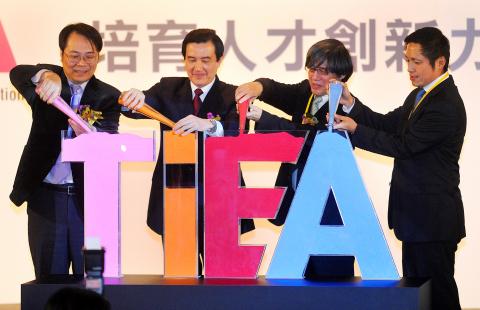The government needs to accelerate the pace of the Internet industry’s development and ease rules on Internet-related activities to catch up with the changes in mobility and data trends, industry leaders said yesterday at the launch of the Taiwan Internet and E-commerce Association (TIEA, 台灣網路暨電子商務產業發展協會) in Taipei.
The association — founded by PChome Online Inc (網絡家庭) chairman Jan Hung-tze (詹宏志), Yahoo-Kimo Inc (雅虎奇摩) vice president Frank Chen (陳建銘) and Google Taiwan general manager Chien Lee-feng (簡立峰) — counts more than 60 international and local companies involved in social networking, Internet media, finance, tourism, logistics and Internet content as members.
The association aims to serve as a bridge for the Internet industry to communicate with the government and help the government fix outdated regulations and systems to improve the environment for the new industry, association chairman Jan said at the launch ceremony.

Photo: Liao Chen-huei, Taipei Times
It also plans to serve as a platform for companies to exchange the latest information, as well as ideas on cooperation and collaboration in the global market, Jan said.
“As more and more activities are connected to the Internet, we think the Internet industry offers ample opportunities for businesses and startups. We hope the TIEA can help discover the industry’s growth potential, which we believe can drive the nation’s economic growth as well,” said Chen, who is one of the association’s chairmen.
However, the government has to be more open-minded and it must loosen policies that restrict the Internet industry from prospering, he added.
Taking the government’s actions on 4G spectrum allocation as an example, Chen said it was moving too slowly and has become a barrier for Taiwanese firms to compete in the global market.
Moreover, the government will next year offer 4G licenses for telecommunications companies, but smartphone users will have to wait until 2015 to access the Internet using the latest wireless communication technologies, he added.
Jan said the government was even slower in catching global trends.
“It’s as if we didn’t have a government in the past 10 years that could have overseen the nation’s development of the Internet industry,” Jan said.
He added that total public investment in the Internet industry over the past 10 years was less than a single investment in a semiconductor wafer fab.
Other than speeding up 4G allocation, the government has to give clearer and more aggressive industry commitments, so that local companies can formulate better strategies, he said.
Chien, another association vice chairman, said a combination of software and hardware is the best solution for Taiwan to overcome difficult times and recover from the economic recession.
He said that the government should exert more effort to promote the Internet industry, which can help transform local industries into high value-added businesses that can compete in the global market.

WEAKER ACTIVITY: The sharpest deterioration was seen in the electronics and optical components sector, with the production index falling 13.2 points to 44.5 Taiwan’s manufacturing sector last month contracted for a second consecutive month, with the purchasing managers’ index (PMI) slipping to 48, reflecting ongoing caution over trade uncertainties, the Chung-Hua Institution for Economic Research (CIER, 中華經濟研究院) said yesterday. The decline reflects growing caution among companies amid uncertainty surrounding US tariffs, semiconductor duties and automotive import levies, and it is also likely linked to fading front-loading activity, CIER president Lien Hsien-ming (連賢明) said. “Some clients have started shifting orders to Southeast Asian countries where tariff regimes are already clear,” Lien told a news conference. Firms across the supply chain are also lowering stock levels to mitigate

IN THE AIR: While most companies said they were committed to North American operations, some added that production and costs would depend on the outcome of a US trade probe Leading local contract electronics makers Wistron Corp (緯創), Quanta Computer Inc (廣達), Inventec Corp (英業達) and Compal Electronics Inc (仁寶) are to maintain their North American expansion plans, despite Washington’s 20 percent tariff on Taiwanese goods. Wistron said it has long maintained a presence in the US, while distributing production across Taiwan, North America, Southeast Asia and Europe. The company is in talks with customers to align capacity with their site preferences, a company official told the Taipei Times by telephone on Friday. The company is still in talks with clients over who would bear the tariff costs, with the outcome pending further

Six Taiwanese companies, including contract chipmaker Taiwan Semiconductor Manufacturing Co (TSMC, 台積電), made the 2025 Fortune Global 500 list of the world’s largest firms by revenue. In a report published by New York-based Fortune magazine on Tuesday, Hon Hai Precision Industry Co (鴻海精密), also known as Foxconn Technology Group (富士康科技集團), ranked highest among Taiwanese firms, placing 28th with revenue of US$213.69 billion. Up 60 spots from last year, TSMC rose to No. 126 with US$90.16 billion in revenue, followed by Quanta Computer Inc (廣達) at 348th, Pegatron Corp (和碩) at 461st, CPC Corp, Taiwan (台灣中油) at 494th and Wistron Corp (緯創) at

NEGOTIATIONS: Semiconductors play an outsized role in Taiwan’s industrial and economic development and are a major driver of the Taiwan-US trade imbalance With US President Donald Trump threatening to impose tariffs on semiconductors, Taiwan is expected to face a significant challenge, as information and communications technology (ICT) products account for more than 70 percent of its exports to the US, Chung-Hua Institution for Economic Research (CIER, 中華經濟研究院) president Lien Hsien-ming (連賢明) said on Friday. Compared with other countries, semiconductors play a disproportionately large role in Taiwan’s industrial and economic development, Lien said. As the sixth-largest contributor to the US trade deficit, Taiwan recorded a US$73.9 billion trade surplus with the US last year — up from US$47.8 billion in 2023 — driven by strong